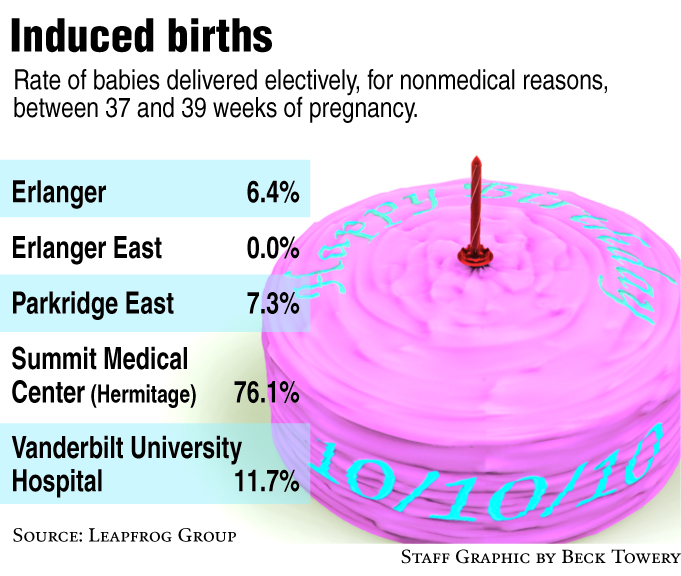After obstetrician Dr. Scott Harnsberger heard that his pregnant patient wanted her labor induced at 38 weeks, just to lock in the birthdate of 8/9/10, he had to put his foot down.
"I had to say, 'I know that's a really cool birthday. If you go into labor that day, that's fine, but we're not going to schedule an induction at that point,'" said Harnsberger, chief of obstetrics at Parkridge East.
She relented, he said, but her husband was disappointed.
Inducing early labor can be a matter of medical necessity, but increasingly, it's a matter of choice for doctors and patients.
Local hospitals and health care quality groups are eyeing the health and financial consequences of choosing an early delivery without any medical reason, a trend experts say has led to a rise in newborns requiring costly stays in intensive care units.
"The data has been amazingly consistent showing there are increased risks with induction prior to 39 weeks," Harnsberger said.
An analysis of 18,000 deliveries in 2007, published in the American Journal of Obstetrics and Gynecology, found that 17.8 percent of babies born through elective procedures without medical cause in the 37th week required a stay in the NICU. That's compared to 8.0 percent of babies born under those conditions in the 38th week, and 4.6 percent in or after the 39th week.
The rates of early elective deliveries-without a valid medical cause-vary widely throughout hospitals in Tennessee, from zero at Erlanger East to 76.1 percent of births at Summit Medical Center in Hermitage, Tenn., according to the 2010 survey from the Leapfrog Group, an employer-driven group focused on quality and efficiency in health care.
Parkridge East reported a 7.3 percent rate of early elective delivery, while Erlanger downtown reported 6.4 percent.
WHY SCHEDULE EARLY?
REASONS FOR INDUCTIONA Childbirth Connection survey of women who gave birth in U.S. hospitals in 2005 found both medical and nonmedical reasons for induction. (Leapfrog's survey only looked at nonmedical labor inductions between 37 and 39 weeks.) These were among the chief reasons given:Caregiver concern they were "overdue" - 25 percentMaternal health problem requiring induction - 19 percentMother's desire to get the pregnancy over with - 19 percentCaregiver concern about the size of the baby - 17 percentSource: Childbirth Connection, a nonprofit focused on improving maternity care
Reasons for early delivery range from a mother wanting to snag a noteworthy birthdate for their unborn baby-the upcoming 11/11/11 is expected to be popular-to an obstetrician hoping to deliver a patient's baby before the doctor's vacation.
Some finance-minded parents even hope to get the delivery under their belt by Dec. 31, so they can qualify for the $3,000-per-child income tax credit on the next year's tax return, Harns-berger said.
But sometimes moms-to-be are just eager for the "fat, hot and miserable" stage of pregnancy to end, Harnsberger said.
"Everybody thinks, 'I can't go another day,' but having the data out there and realizing that you're exposing their baby to more potential problems, it arms physicians to be able to say 'no' a little bit easier," he said.
In March, Parkridge officials sent a letter warning physicians who deliver babies in the hospital that they would not be permitted to deliver babies before 39 weeks without a medical reason, Harnsberger said.
Hutcheson Medical Center in Fort Oglethorpe which did not participate in the Leapfrog survey, has implemented the same policy, said spokeswoman Haley Johnson.
At Erlanger, obstetricians scheduling elective deliveries before 39 weeks are flagged and discouraged from doing so without a true medical cause, such as a mother's high blood pressure or the water breaking before labor, said Dr. Michael Sprague, OB-GYN at Erlanger.
"It seems like the difference between 38 weeks and 39 weeks of pregnancy is very small," he said. "We just know that's not the case."
CRITICAL TIME FOR BABIES
Crucial developments happen in the last weeks of pregnancy, and cutting those weeks short can leave babies with developmental delays, respiratory issues and other problems.
Babies are considered premature before 37 weeks, but nailing down a baby's due date is an imperfect art. A baby scheduled for delivery at 37 weeks could actually be 36 weeks, doctors say.
At 35 weeks gestation, a baby's brain weighs only two-thirds of what it will weigh at 40 weeks, said Dr. Michael Warren, maternal and child health for the Tennessee Department of Health.
Babies born later also are less likely to be jaundiced, have respiratory problems and more likely to be able to regulate their body temperature, he said.
For women whose cervix is not open enough for delivery, elective inductions before 41 weeks increase the chances of having a Caesarean section.
A voluntary hospital-based pilot program in Davidson County, soon to spread statewide, simply compels physicians to write down the reason for any scheduled delivery, said neonatologist Dr. Peter Grubb, medical director of the Tennessee Initiative for Perinatal Quality Care, which is focused on improving birth outcomes in Tennessee.
The documentation helps hospitals track rates of elective early deliveries as well as reminds doctors to consider whether elective delivery is necessary, Grubb said.
"It's very simple. ... Once people start to think about it, its shines light on it and makes them aware," he said.
Drastically cutting these rates is within all hospitals' reach if they simply focus on the issue, educate physicians and patients about the risks, and require oversight of these elective deliveries, said Missy Danforth, director of communications for Leapfrog Group.
"These aren't expensive things. This isn't buying new technology," Danforth said. "It's saying, 'This is a practice that's outside the clinical guidelines, and we're going to do whatever we can to try to prevent it.'"

